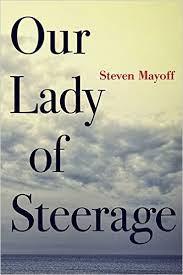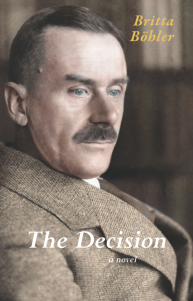I have been a terrible book blogger this year and whilst I owe apologies all round for visiting so infrequently and not replying to comments (I do hope for better things in the second half of 2016), I’ve also got two book reviews particularly on my conscience. Steven Mayoff’s Our Lady of Steerage and Britta Böhler’s The Decision were novels I read in December of 2015 and faithfully promised to review either on this site or Shiny. Six months late they may be, but the following accounts do seem oddly pertinent to the political moment, one way or another.
 Steven Mayoff’s Our Lady of Steerage is a novel about emigration, the story of ‘Everyone who ever crossed an ocean to escape the inescapable.’ Its central focus is Mariasse Knyszinski who runs away from an overbearing father and a downtrodden mother in Poland to follow her beloved cousin, Piotr, to the promised land of Canada. The year is 1923 and she boards the S. S. Montmartre in Cherbourg for the week-long trip across the Atlantic, a voyage that will indelibly alter the lives of several of the travellers. Mariasse meets a young Jewish couple, Shulim and Betye who have suffered a tragedy during the train journey from Bucharest to Paris: their five-year-old son fell ill and died en route. Betye is so prostrated by grief that she is unable to care for her baby, Dvorah, (known as Dora for most of the novel), and Mariasse willingly takes on this task. The week of devotion creates a life-long bond between Mariasse and Dora, and also links Mariasse with the Krager family, whose son, Aaron, will come to benefit from the innate goodness in Mariasse that his parents so admire.
Steven Mayoff’s Our Lady of Steerage is a novel about emigration, the story of ‘Everyone who ever crossed an ocean to escape the inescapable.’ Its central focus is Mariasse Knyszinski who runs away from an overbearing father and a downtrodden mother in Poland to follow her beloved cousin, Piotr, to the promised land of Canada. The year is 1923 and she boards the S. S. Montmartre in Cherbourg for the week-long trip across the Atlantic, a voyage that will indelibly alter the lives of several of the travellers. Mariasse meets a young Jewish couple, Shulim and Betye who have suffered a tragedy during the train journey from Bucharest to Paris: their five-year-old son fell ill and died en route. Betye is so prostrated by grief that she is unable to care for her baby, Dvorah, (known as Dora for most of the novel), and Mariasse willingly takes on this task. The week of devotion creates a life-long bond between Mariasse and Dora, and also links Mariasse with the Krager family, whose son, Aaron, will come to benefit from the innate goodness in Mariasse that his parents so admire.
What follows is the account of these intertwined lives from the early 1920s to the early 1960s, but the recounting of the events is in no way linear. Instead, we skip around in time, visiting moments in the 1940s or 30s before heading into the past to understand what provoked them. From very early on in the novel, we realize that Mariasse and Dora are destined for terrible emotional hardships that will break them both, and only gradually do we piece together the chain of events that befall them. I thought that the disjointed chronological structure was the most impressive part of this novel. It is clever and well-orchestrated and adds depth and tension to the narrative. Mayoff teases the reader who wants to know what happens when Mariasse and Piotr finally meet (he doesn’t know she is coming), what drives Dora to a suicide attempt and electric shock therapy, what happens to the angry, bitter Betye, why Mariasse abandons Catholicism and embraces Judaism – and then why she converts back again. For me, the constant switchbacks really made the reading experience.
What’s perhaps more problematic is the bleakness of the story. It didn’t feel like a political point was being made here – it’s not the treatment the immigrants receive at the hands of the Canadians, for instance, that gives the characters pain. A more likely cause seems to be the displacement a person feels when they leave their native land behind, when family trouble or political unrest or poverty forces them into an exile that they will never really come to terms with, even when it has been undertaken with determined hope. And then again, there seems to be a deep vein of mental instability in the characters, combined with the hardship of just living, that cannot be assuaged. The bleakness is inevitable, however, when we consider the characterisation of Mariasse, who is supposed to be the light and hope of the novel, but who never really feels convincing on the page. Had she been a stronger force for good, rather than a nice person who is continually put-upon until she cracks, a more balanced novel might have resulted. Betye, on the other hand, leaps off the page at you and electrifies her scenes, and Dora never seems to overcome the legacy of being her daughter, or of her early neglect.
A very interesting part of Canadian history under the microscope and some fine storytelling to be had, then, but a dark, dark story.
 Britta Böhler’s novel The Decision, focuses on three momentous days in the life of the German Nobel prize-winning author, Thomas Mann. Between the 31st January and the 2nd of February 1936, Mann frets over a terrible choice he must make. Does he or does he not denounce the Nazi party in the Swiss press? On the one hand, he feels morally compelled to do so, horrified by all that is happening in his beloved homeland and urged on by his politically-minded daughter. But on the other, any such denunciation comes at the cost of permanent exile, the loss of his German readership, the probable burning of his books.
Britta Böhler’s novel The Decision, focuses on three momentous days in the life of the German Nobel prize-winning author, Thomas Mann. Between the 31st January and the 2nd of February 1936, Mann frets over a terrible choice he must make. Does he or does he not denounce the Nazi party in the Swiss press? On the one hand, he feels morally compelled to do so, horrified by all that is happening in his beloved homeland and urged on by his politically-minded daughter. But on the other, any such denunciation comes at the cost of permanent exile, the loss of his German readership, the probable burning of his books.
This is only a short novella, but it achieves a masterful portrait of Thomas Mann. Sitting comfortably in the close third person, the voice is a brilliant evocation of a committed artist – the hypersensitivity, the hypochondria, the euphoria and the passion of creation, along with the lengthy stretches of insufficient work done, the anxieties over creative sterility. Thomas Mann loved Germany, and he needed his routine, clung to it and all the other beloved familiarities that allowed him to venture into the realm of his imagination. The occasion for his exile is an ironic one, a long essay he wrote about his hero, Wagner that became the basis for a lecture tour, and which was used by the authorities to denounce him, claiming he had ‘besmirched the memory of the great composer’. Mann is hurt, bewildered, and aware of the danger he is in. The denunciation is used as an excuse for the Nazis to search his house and he fears for the safety of his notebooks, in which he has written everything he could never say elsewhere, not least his romantic feelings for beautiful young men.
And so a holiday in Switzerland turns into a permanent exile, and from this most uncomfortable of positions, Mann must negotiate not only his personal effects, but his critical reputation. What sustains him during this time is, naturally, his creativity. He is writing the first novel in his tetralogy, Joseph and his Brothers, in what would become an epic work demanding 16 years of his life.
The great novel is set in the distant past, and yet it’s so near. Joseph, too, is an outcast, driven against his will from his own land by his jealous brothers, he has to find a new home in a strange country. A stranger in a world that he doesn’t understand. And Joseph, too, takes satisfaction in order and wants everything to be consistent; he takes a stand against chaos and disorder. Against the emergence of destructive forces that threaten a peace that is only apparently safe. It’s as if when he started the book he had an inkling that the same fate would befall him one day.’
I just loved this; I have a weakness for novels about writers in any case, and this is so exquisitely done. The whole of Mann’s life is here, combined with a neat but powerful account of what was happening in the German republic. Mann is a public figure and he takes pride in his prominence; he feels a duty to speak out, at a time when ‘anyone who does nothing, participates’. But he knows to do so might be the end of his life as a published writer. The decision he comes to, and how he makes it, feel exactly right.
